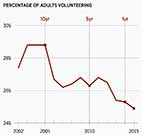|
|
 |
|
The
views expressed
on this page are soley those of the author and do not
necessarily
represent the views of County News Online
|
 |
Heritage Foundation
Improving the
Quantity and Quality of America’s Volunteerism
Brian Fikkert
Volunteerism dropped in 2015, continuing a decade-long trend in which
the percentage of adults who volunteer has declined by a total of 3.9
percentage points. Regrettably, these recent declines are part of a
century-long decrease in rates of volunteerism in America,[1] a trend
rooted in fundamental issues that hinder not only the quantity, but
also the quality of our volunteerism.
One of the most important of these issues is widespread materialism:
the belief that happiness comes from acquiring more possessions.
Although the seeds of materialism have been present since America’s
inception, a combination of philosophical, economic, and social forces
in the past century has resulted in a culture that is increasingly
focused on material progress as the source of happiness.[2]
Materialism is necessarily self-centered, while volunteerism is
others-centered. Hence, it is not surprising that researchers are
finding materialistic people to be less likely to volunteer — a fact
that explains at least some of the decline in the quantity of
volunteerism in America.[3] But materialism also affects the quality of
our volunteerism. For example, consider volunteerism targeted at
alleviating poverty.
Because Americans tend to think of poverty in material terms, our
approaches to helping the poor often tend toward merely providing them
with material resources: dispensing food, ladling soup, and giving out
clothing. In times of crisis, such handouts are the appropriate
response, but when low-income individuals or communities are in a
chronic state of poverty, this approach amounts to treating symptoms
rather than addressing the underlying causes of their condition. There
are deeper forces at work that must be addressed.
If we listen carefully to the poor, we can hear them longing for more
than just greater consumption, for they commonly express feelings of
shame, inferiority, social isolation, and powerlessness. These problems
involve far more than a lack of material things, and simply handing out
more material resources cannot solve them.
While human beings are partly material — we have bodies and real
physical needs — both the wisdom of the ages and scientific evidence
teach us that human beings are hardwired for relationships: with God,
self, others, and the environment.[4] More often than not, it is the
brokenness in these foundational relationships that leads to material
poverty, but these relationships cannot be repaired by handouts of
material resources alone.[5] In fact, handouts can make these
relationships worse.
How Can a Material Approach to Poverty Do Harm?
Simply providing handouts of material resources to poor people can
exacerbate their feelings of shame and inferiority and undermine the
development of their own skills and resources. As a result, handouts
can render poor people even more powerless than they were before they
received the “help.”
Short-term trips to low-income communities abroad often provide prime
examples of this dynamic. Volunteers rush in to build houses and dig
wells — things that the community could do on its own — thereby
undermining local initiative, ownership, and stewardship. Similarly,
such trips often dispense clothing and shoes, which can undermine local
businesses and create dependence on the outsiders.[6]
Do More, But Do It Differently
Evidence and experience show that we need to use more relational
approaches, walking alongside poor people instead of treating them as
objects of our assistance.[7] This engages poor people as full
participants in the process, building on their assets and abilities in
order to restore their dignity and capacity. The goal in such an
approach is not simply to increase the material condition of poor
people, but also to help them experience greater flourishing in their
relationships with God, self, others, and the environment.
One example is the Circles of Support model.[8] In this approach, the
poor person chooses and leads a team of “allies” who surround the
person with encouragement, community, accountability, and various forms
of assistance. In addition, the allies provide access to crucial social
and professional networks and can even provide advocacy when systemic
injustice is an issue.
One key to more and better volunteerism is the rejection of materialism
in favor of a relational understanding of human nature. As we make this
shift, we open up possibilities for greater human flourishing both for
the helpers and for those who are being helped.
|
|
|
|

